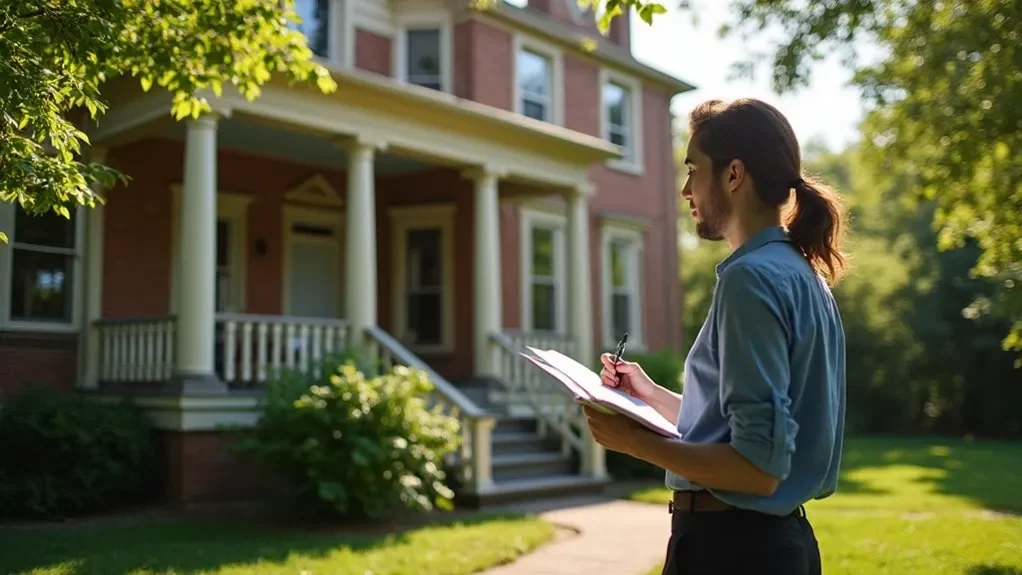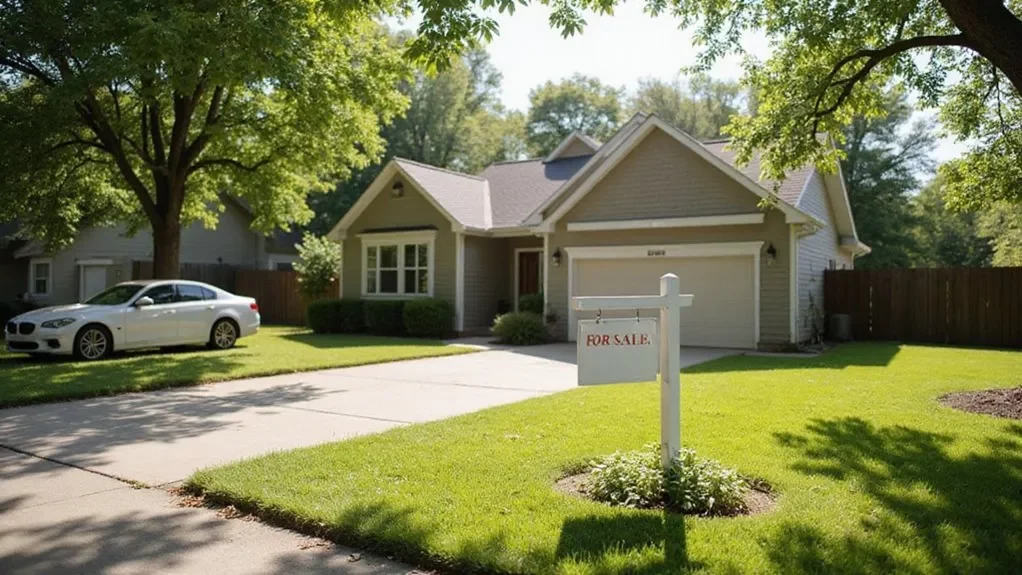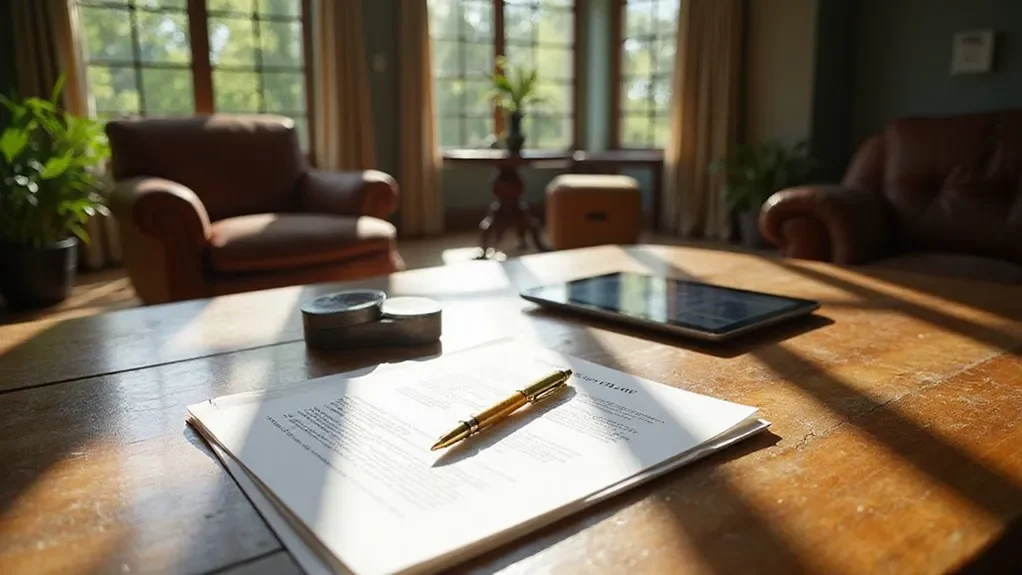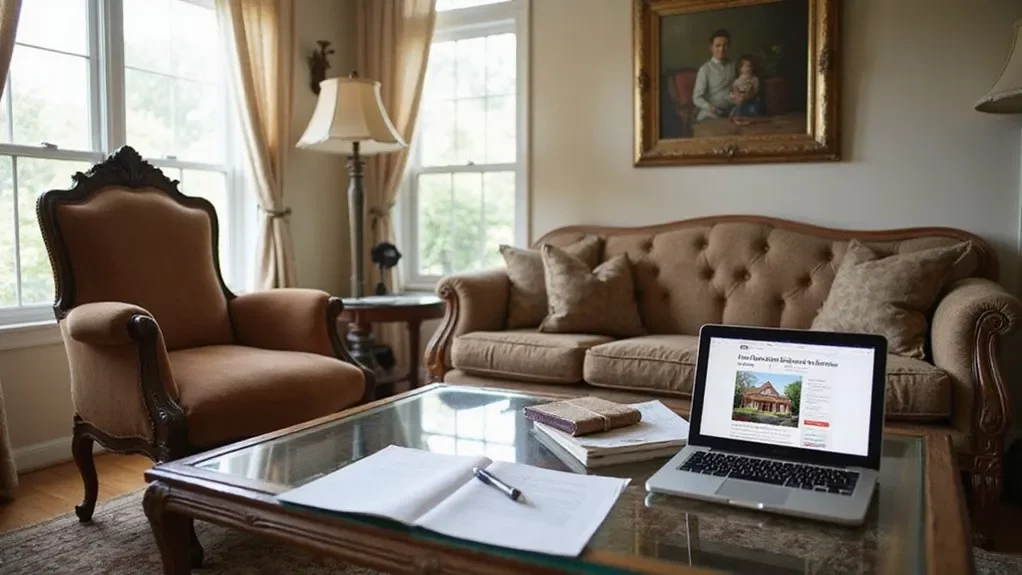Inheriting property often turns into a bureaucratic maze, trapping heirs between grief and legal complexities. Selling an inherited house quickly might seem like a simple solution, but probate requirements create significant roadblocks. Fortunately, understanding your legal options can help navigate these challenges and potentially accelerate the property transfer process.
Generally, selling an inherited house before probate completion isn’t possible because court approval is legally required for ownership transfer. Properties held in trusts or with joint ownership may qualify for exceptions, but most estates must complete probate before any sale.
In this blog I will explore everything related to selling inherited houses before probate completion.
Key Takeaways
- Selling an inherited house before probate is generally not allowed without court approval or proper legal authority.
- Probate must typically be completed or an executor appointed before selling the property legally.
- Exceptions include properties held in trusts or jointly owned with rights of survivorship.
- Alternative options like probate advances or heir buyouts can provide quicker access to the estate’s value.
- Working with real estate professionals or legal experts ensures compliance and smooth sale processes.
What Is Probate and Why Does It Matter?

Probate is a court-supervised process for distributing a deceased person’s assets. It ensures debts get paid and heirs receive their rightful inheritance.
The court appoints a personal representative to handle the deceased’s estate during probate. This legal oversight protects the rights of all involved parties. Without probate, asset transfers could lead to disputes or fraud.
Property can’t legally transfer to heirs before the probate process completes. For most families, understanding probate helps reduce confusion during an already difficult time.
Furthermore, proper planning can sometimes minimize probate complications.
Can You Legally Sell an Inherited House Before Probate?

No, you typically can’t sell an inherited house before probate is complete. The court must first appoint a personal representative to handle the estate. Any sale attempted before this appointment lacks legal validity.
Unauthorized sales can be reversed and may result in legal penalties. The process protects all potential heirs and creditors with claims to the property.
However, exceptions exist for certain situations. Properties held in trusts, owned jointly with right of survivorship, or designated with transfer-on-death deeds may bypass probate requirements.
These alternative arrangements allow for immediate sale without court involvement.
What Are the Exceptions to Selling Before Probate?

You can bypass probate in some cases, like when the property is held in a living trust or owned with survivorship rights.
Small estates under a certain value might also qualify for quick transfer without full probate.
However, Florida doesn’t recognize Transfer-on-Death deeds for real estate, so those options usually don’t apply here.
Small Estate Exemptions
Small estate exemptions let you bypass probate when an estate falls below specific value limits. This process saves time, money, and paperwork for heirs.
Each state sets different thresholds ranging from $20,000 to $300,000. The simplified procedure typically requires filing an affidavit or simplified petition.
For property transfers, the process works through sworn statements rather than court appearances. Beneficiaries can receive assets within weeks instead of months or years.
Additionally, most states allow transfer of real estate through small estate procedures if the property value qualifies.
Before proceeding, verify your state’s requirements and property value limits. In some cases, professional assistance may still be beneficial.
Transfer-on-Death Deeds
Florida doesn’t recognize Transfer-on-Death (TOD) deeds for real estate. These deeds can’t be used for informal property transfers in Florida.
State law requires formal probate processes for real property instead of TOD arrangements.
Property owners must explore alternative estate planning methods in Florida. Revocable trusts often serve as effective substitutes for TOD deeds. Additionally, joint tenancy with rights of survivorship might achieve similar results.
In other states where TOD deeds are valid, beneficiaries can typically sell inherited property quickly after death.
However, proper recording of the deed remains essential for a smooth transfer process.
Living Trusts
Property in living trusts bypasses probate after death. Beneficiaries can transfer ownership immediately instead of waiting months for court approval. This quick process saves time, money, and emotional stress during a difficult period.
Trust creators maintain control of their assets while alive but establish clear succession plans. The property smoothly transitions to heirs without public probate proceedings. For instance, a home can be sold quickly if beneficiaries need funds.
Therefore, living trusts offer significant advantages for those wishing to simplify inheritance. They provide peace of mind and protect loved ones from unnecessary complications.
Joint Ownership with Survivorship Rights
Property transfers automatically to the surviving owner when held as joint tenants with right of survivorship. No probate is needed. You can sell the property without court approval as the surviving owner.
A death certificate is required to transfer the title officially. This documentation proves your legal right to the property. The process is typically faster than traditional inheritance methods.
The main benefit is avoiding lengthy probate proceedings. Property transitions smoothly to survivors without legal complications. Additionally, this arrangement provides immediate access to the property’s value.
How to Sell an Inherited House During Probate?
To sell an inherited house during probate, you need the executor’s authority, usually granted by the court through a petition.
You might be able to use independent administration if allowed, which simplifies the process, but court approval is often required.
Working with experienced real estate professionals helps ensure the sale follows legal requirements and protects all parties involved.
Obtaining Executor Authority
To sell an inherited house during probate, you need court-appointed authority. The court must first appoint you as personal representative.
You must file a petition with the probate court requesting permission to sell the property. Next, obtain Letters of Administration that document your authority. These official papers legally establish your right to manage estate assets.
The court requires this process to protect all heirs and creditors. Without proper authorization, any property sale could be invalidated later.
Most states have specific waiting periods and notification requirements. Local probate laws determine exactly how long this process takes, typically 2-4 months.
Court Petition Process
You must file a petition with the probate court to sell an inherited house during probate. This legal document requests permission from the court to proceed with the sale.
The petition requires a certified property appraisal to establish fair market value.
As executor, you’re responsible for submitting all necessary paperwork correctly. The court reviews these documents to protect all beneficiaries’ interests.
Furthermore, judges want to ensure the property sells for a reasonable price. After receiving court approval, you can list the property and accept offers.
Throughout this process, maintain complete transparency with all heirs and the court.
Independent Administration Options
Independent administration lets executors sell inherited property with minimal court involvement. You can proceed in two main ways: obtain explicit court approval or use your independent powers.
Independent administration requires proper documentation and fair market pricing through certified appraisals. Agreement from all heirs should be secured before proceeding with any sale. This documentation protects everyone involved.
The primary benefit is efficiency. Court processes typically slow down property sales considerably.
With independent administration, transactions move faster while still maintaining proper oversight. This balance respects both legal requirements and the executor’s need to settle the estate promptly.
Working with Real Estate Professionals
Real estate professionals provide essential help during probate property sales. They understand legal requirements and guide you through court approval processes. An experienced agent prepares the paperwork and handles communication with the court.
These professionals accurately price your inherited property based on current market conditions. They also create marketing strategies that attract serious buyers quickly. Probate sales must follow specific legal procedures that vary by state and county.
Moreover, realtors handle property viewings and negotiations with potential buyers. As a result, you can focus on other important aspects of the probate process.
What Are the Financial Implications of Selling Before Probate?
Selling an inherited house before probate can trigger tax issues, like capital gains, since the basis is set at the date of death.
You also risk unpaid debts and liens, which the estate is responsible for settling. Plus, proceeds from the sale must go through the estate first, affecting how and when heirs receive their inheritance.
Tax Consequences
Inherited property sales have specific tax implications based on timing. You can’t legally sell an inherited house before probate begins. After probate starts, the property receives a stepped-up tax basis to its value at the owner’s death. This reduces your capital gains tax liability.
Capital gains taxes apply only to appreciation after inheritance. The stepped-up basis effectively eliminates taxes on gains that occurred during the deceased’s ownership.
Furthermore, different states have varying inheritance and estate tax laws that may affect your total tax burden.
Rental income from the inherited property is fully taxable before the estate settles. As a result, proper tax planning can save you significant money when dealing with inherited real estate.
Capital Gains Considerations
You’ll pay capital gains taxes when you sell an inherited house after probate. The tax amount depends on the stepped-up basis of the property. This basis equals the market value of the house at the time of the owner’s death.
If you sell before probate finishes, you might face higher tax bills. Profits above the stepped-up basis become taxable as capital gains. The IRS will require payment for any amount that exceeds this value.
However, you can reduce your tax burden with proper timing. Most importantly, keep detailed records of all home improvements made after inheritance. These expenses can offset potential gains.
Debt and Lien Responsibilities
You must settle debts and liens during probate before selling an inherited house. All estate debts must be paid from estate assets before property transfers to heirs.
The estate remains responsible for mortgage payments until final settlement. Lenders can foreclose if payments stop, even during probate.
The probate court oversees this process to protect creditors and beneficiaries. Each state has specific legal requirements for transferring real estate through probate.
Attempting to sell before completing these steps could invalidate the transaction entirely. Furthermore, title companies won’t issue clear title without probate completion and debt resolution.
Proceeds Distribution Requirements
Estate proceeds must follow a legal distribution order before beneficiaries receive money. All debts and taxes must be paid first from the sale funds. The court must approve property sales during probate to ensure proper handling.
The distribution process follows three main steps. First, you need court permission to sell inherited property.
Next, the money pays off estate debts and obligations. Finally, any remaining funds go to beneficiaries according to the will or state law.
Selling before probate completion can result in legal penalties or sale reversals. This approach protects creditors and ensures fair treatment for all parties involved.
What Are the Alternatives to Waiting for Probate?
If you want to avoid waiting for probate, several options can speed things up. You might consider cash home buyers, who purchase probate properties quickly, or look into probate advances that give you early access to inheritance funds.
Alternatively, heirs can buy out others’ interests or sell partial stakes in the property to move forward without full probate delays.
Cash Home Buyers Advantage
Cash buyers provide a faster way to sell inherited property before probate completion. They purchase homes in as-is condition without repairs or upgrades. You can receive cash offers within days instead of months.
These buyers eliminate court approval requirements in many situations. Holding costs like taxes, insurance, and maintenance can be reduced significantly. Heirs with urgent financial needs benefit most from this option.
The process works through direct purchases that bypass traditional real estate channels. Your inherited property sale can conclude quickly, helping resolve estate matters sooner.
Probate Advances
Probate advances provide quick funds for heirs while waiting for probate to complete. They offer immediate cash for those facing financial strain during estate settlement. You receive money now against your expected inheritance amount.
All property sales during probate still require court approval. This legal requirement protects all beneficiaries’ interests.
Even with a probate advance, you can’t bypass the court process for selling inherited real estate.
However, the advance itself doesn’t need court permission. The funding company simply purchases a portion of your future inheritance. As a result, you gain financial flexibility without breaking probate laws.
Heir Buyouts
Heir buyouts let family members skip probate by purchasing others’ interests in inherited property. This solution saves time and prevents forced property sales.
You must first establish the property’s value through formal appraisals or mutual agreement. Legal documents should clearly outline the terms between all parties. Payment options include cash, personal loans, or mortgage financing.
The process works especially well when heirs have different goals for the property. For instance, one heir might want to keep a family home while others prefer immediate cash.
Furthermore, buyouts can help preserve family harmony during an emotionally difficult time.
Partial Interest Sales
You can’t sell a partial interest in an inherited house before probate concludes. The deceased remains the legal owner until the estate settles. However, exceptions exist for certain situations.
Co-owners with survivorship rights may sell their portion immediately. Properties held in trusts can also bypass typical probate requirements.
These arrangements allow faster transfer of ownership rights under inheritance law.
These alternatives help heirs access property value sooner. Furthermore, you won’t face the lengthy waiting periods associated with standard probate processes.
With proper planning, partial interest sales become a viable option for those needing quick access to inheritance funds.
How to Avoid Probate Altogether When Inheriting Property?
You can bypass probate when inheriting property by using specific legal tools. The most effective methods include creating a revocable living trust for your property.
Joint ownership with right of survivorship allows automatic transfer to the surviving owner.
Transfer on Death deeds legally pass real estate directly to named beneficiaries upon your death.
These strategies enable direct property transfers without court involvement. Your beneficiaries gain immediate access to inherited assets.
The property can be sold quickly without waiting for probate completion. This approach saves time, reduces stress, and minimizes legal expenses.
Ready to Sell Your Inherited House? Greg Buys Houses Can Help
Greg Buys Houses helps you sell inherited property quickly for cash. They streamline the process when you’ve inherited a home and need to sell fast. Their service allows you to bypass court proceedings in many cases.
Greg Buys Houses specializes in removing common obstacles that delay inherited property sales.
Legal requirements often slow down traditional real estate transactions for inherited homes. Cash offers eliminate financing contingencies and reduce paperwork.
Their team handles the details while you focus on other priorities during this transition. The process typically concludes in days rather than months. For quick resolution of inherited property matters, their cash purchase option provides immediate solutions.
Frequently Asked Questions
Do I Need to Notify the IRS About Selling Inherited Property?
Remember, honesty is the best policy. You must notify the IRS when you sell inherited property, report the sale, and potentially pay capital gains tax based on the property’s stepped-up basis and your profit.
Can I Sell My Mom’s House Before Probate?
You can’t sell your mom’s house before probate unless it’s in a trust, owned jointly with survivorship rights, or transferred through a death deed. Otherwise, you must wait for court approval to avoid legal risks.
Can I Do Anything Before Probate Is Granted?
Before probate is granted, you can’t sell the property unless it’s in a trust, owned jointly, or has survivorship rights. Otherwise, wait for court approval to avoid legal issues and protect everyone’s interests.
What Are the Tax Implications of Selling an Inherited Property?
Tax tangles tend to target those selling inherited property. You’ll likely face capital gains taxes on gains over the stepped-up basis, but selling at market value minimizes taxes. Talk to a tax pro for precise, personalized planning.

